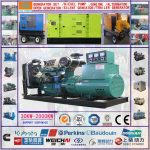Introduction
In today's fast-paced world, data acquisition plays a crucial role in various industries such as telecommunications, healthcare, manufacturing, and more. Data acquisition involves collecting, measuring, and analyzing data from different sources to make informed decisions and improve processes. One of the essential components for data acquisition systems is a reliable power source, and diesel generators have proven to be a popular choice for providing backup power in such applications. In this article, we will explore the use of diesel generators for data acquisition, their benefits, considerations, and best practices.
Overview of Diesel Generators
Diesel generators are a type of backup power system that uses a diesel engine to generate electricity. They are commonly used in applications where a reliable and continuous power supply is essential, such as hospitals, data centers, industrial facilities, and more. Diesel generators are known for their efficiency, reliability, and durability, making them a popular choice for critical power applications.
Diesel generators consist of three main components: the diesel engine, the alternator, and the control panel. The diesel engine is responsible for converting diesel fuel into mechanical energy, which drives the alternator to produce electricity. The control panel monitors the generator's performance, controls its operation, and ensures a seamless transition to backup power when the main power source fails.
Benefits of Diesel Generators for Data Acquisition
1. Reliability: One of the primary advantages of using diesel generators for data acquisition is their reliability. Diesel engines are known for their robustness and durability, making them well-suited for continuous operation over extended periods. This reliability is crucial for data acquisition systems that need to operate 24/7 without any interruptions.
2. Fuel Efficiency: Diesel generators are highly fuel-efficient compared to other types of backup power systems. Diesel fuel has a higher energy density than gasoline, which means that diesel generators can generate more power using less fuel. This fuel efficiency not only helps reduce operating costs but also ensures a longer runtime during power outages.
3. Longevity: Diesel generators are known for their longevity and low maintenance requirements. With proper care and maintenance, a diesel generator can last for decades, providing reliable backup power for data acquisition systems. This longevity makes diesel generators a cost-effective solution in the long run.
4. Quick Start-Up: Diesel generators have a fast start-up time, usually within seconds of a power outage. This quick response time is crucial for data acquisition systems that cannot afford any downtime. Diesel generators can seamlessly take over the power supply, ensuring uninterrupted operation of the data acquisition equipment.
Considerations for Using Diesel Generators in Data Acquisition
While diesel generators offer numerous benefits for data acquisition systems, there are several considerations to keep in mind when selecting and operating a diesel generator:
1. Sizing: It is essential to properly size the diesel generator to meet the power requirements of the data acquisition system. Undersized generators may not be able to handle the load, leading to equipment damage or failure. Oversized generators, on the other hand, can result in inefficient operation and increased fuel consumption. Consulting with a professional to determine the right size generator for your specific needs is recommended.
2. Fuel Storage: Diesel generators require a steady supply of diesel fuel to operate. It is crucial to have an adequate fuel storage system in place to ensure continuous operation during power outages. Regular fuel testing and maintenance are also essential to prevent fuel degradation and ensure the generator's reliability.

3. Maintenance: Regular maintenance is key to ensuring the optimal performance of a diesel generator. Routine inspections, oil changes, filter replacements, and load bank testing are essential to keep the generator in top condition. Neglecting maintenance can lead to decreased efficiency, increased fuel consumption, and potential breakdowns.
4. Emissions: Diesel generators produce emissions during operation, including nitrogen oxides (NOx), particulate matter, and carbon monoxide. It is important to comply with local regulations and environmental standards to minimize the impact of these emissions. Installing 300kw diesel generator for agricultural use and using low-sulfur diesel fuel can help reduce the generator's environmental footprint.
Best Practices for Using Diesel Generators in Data Acquisition
To ensure the reliable operation of a diesel generator in a data acquisition system, the following best practices should be followed:
1. Regular Testing: Conduct regular load testing and maintenance checks to ensure the generator is in optimal condition. Testing the generator under load simulates real-world conditions and helps identify any potential issues before they escalate.
2. Fuel Management: Implement a comprehensive fuel management plan that includes regular fuel testing, fuel quality monitoring, and fuel replenishment schedules. Proper fuel management is essential to prevent fuel degradation and ensure the generator's reliability.
3. Remote Monitoring: Utilize remote monitoring systems to track the performance of the diesel generator in real-time. Remote monitoring allows operators to identify any anomalies or issues promptly and take corrective actions to prevent downtime.
4. Training: Provide training for personnel responsible for operating and maintaining the diesel generator. Proper training ensures that operators are familiar with the generator's operation, safety procedures, and maintenance requirements, reducing the risk of errors or accidents.
Conclusion
Diesel generators are a reliable and efficient power source for data acquisition systems that require continuous operation and backup power capabilities. By understanding the benefits, considerations, and best practices of using diesel generators, organizations can ensure the seamless operation of their data acquisition systems even during power outages. With proper sizing, maintenance, and fuel management, diesel generators can provide a dependable power supply for critical data acquisition applications. By following best practices and investing in regular maintenance, organizations can maximize the longevity and performance of their diesel generators, ensuring uninterrupted data acquisition operations.
